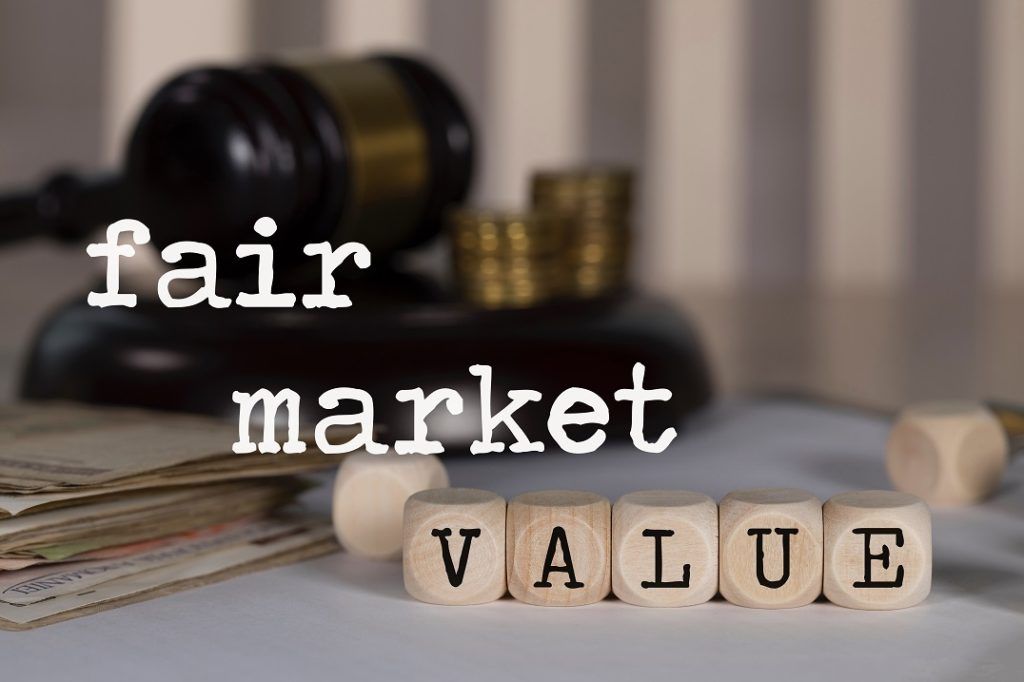Fair Market Definition Business Valuation
What is Fair Market Value?
The fair market value (of a good or service being exchanged) refers to the price at which both transacting parties (the buyer and the seller of that good or service) have agreed to independently.

If certain conditions are met, the fair market value will represent an accurate valuation of the goods being exchanged. The conditions are as follows:
- There shall be no asymmetries of information Asymmetric Information Asymmetric information is, just as the term suggests, unequal, disproportionate, or lopsided information. It is typically used in reference to some type of business deal or financial arrangement where one party possesses more, or more detailed, information than the other. . It means that both parties must be equally and reasonably knowledgeable about the asset or good in question.
- Both parties must be perfect logisticians and economic agents. It means that they must behave in their own self-interest.
- Both parties must be free of any undue pressure to execute the transaction.
- A reasonable amount of time must be available to execute the transaction.
The abovementioned conditions are economic principles that determine the degree of freedom and openness in any market activity. Therefore, fair market value is different from market value, which is the current price of a given asset in a given marketplace. For example, the price of Treasury bills Treasury Bills (T-Bills) Treasury Bills (or T-Bills for short) are a short-term financial instrument issued by the US Treasury with maturity periods from a few days up to 52 weeks. allotted via a competitive bidding process does not reflect their fair market value.
Significance of Fair Market Value
1. Legal situations
In the event of a divorce settlement or payment of damages due to harm caused to private property, the fair market value of the asset in question is used.
2. Taxation
Fair market value is used to assess the municipal property taxes to be paid by an owner. Tax deductions are also available on casualty loss and depreciation of assets. In cases of charitable donations, the fair market value of the donation is used for tax purposes. Therefore, a taxpayer can claim a tax credit for the fair market value of the donation made.
The process of price discovery employed by professionals in such a situation is known as appraisal. However, fair market value is different from appraised value as the latter represents the worth of the good from only one party's point of view.
3. Insurance
Fair market value is also determined in cases of insurance claims. If an insured vehicle gets damaged, the insurance claim is proportional to the current fair market value of the vehicle and not the price at which the vehicle was originally bought.
What is an Appraisal?
An appraisal refers to the process of valuation of any asset: a property, good, or business. It is used to determine the selling price of assets or to calculate tax liabilities. A variety of methods can be used by appraisers for price discovery. Such methods include risk analysis and comparing the current market value of similar objects.
For companies, fair market value refers to the accepted current value of one share of the company's total stock. It is different from the overall valuation of a company, which includes all its assets and liabilities.
The fair market value of a public company's stock can be calculated by averaging its highest selling price and the lowest selling price in one trading day. For private companies, the same is done by comparing the valuation ratios Relative Valuation Models Relative valuation models are used to value companies by comparing them to other businesses based on certain metrics such as EV/Revenue, EV/EBITDA, and P/E of private companies to that of public companies.
More Resources
CFI is the official provider of the global Commercial Banking & Credit Analyst (CBCA)™ Program Page - CBCA Get CFI's CBCA™ certification and become a Commercial Banking & Credit Analyst. Enroll and advance your career with our certification programs and courses. certification program, designed to help anyone become a world-class financial analyst. To keep advancing your career, the additional CFI resources below will be useful:
- Book Value vs. Fair Value Book Value vs Fair Value In accounting and finance, it is important to understand the differences between book value vs fair value. Both concepts are used in the
- Forced Sale Value Forced Sale Value A forced sale value is the estimate of the amount that a business would receive if it sold off its assets one piece at a time during an unforeseen or uncontrollable event. The appraiser assumes that the business needs to sell its assets within a short duration at an immediate auction.
- Lower of Cost or Market (LCM) Lower of Cost or Market (LCM) Lower of cost or market (LCM) is an inventory valuation method required for companies that follow U.S. GAAP. In the lower of cost or market
- Supply and Demand Supply and Demand The laws of supply and demand are microeconomic concepts that state that in efficient markets, the quantity supplied of a good and quantity
Fair Market Definition Business Valuation
Source: https://corporatefinanceinstitute.com/resources/knowledge/accounting/fair-market-value/
Post a Comment for "Fair Market Definition Business Valuation"